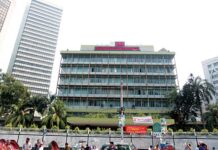
The country’s trade deficit in the first seven months of the current financial year decreased by 29.36 per cent compared with that of the same period of FY 2011-12 due mainly to negative import growth, said Bangladesh Bank officials.
According to the latest BB data, the import in July-January registered a negative growth of 3.34 per cent to $19.24 billion from $19.90 billion during the corresponding period of FY 2011-12.
On the other hand, the country’s exports increased by 8.28 per cent to $14.90 billion in July-January of the financial year from $13.76 billion during the same period in FY 2011-12.
Under the circumstances, the trade deficit, the gap between export earning and import payment, decreased by 29.36 per cent to $4.34 billion in the first seven months of the financial year against $6.14 billion in the same period of FY 2011-12.
It is usually considered that a narrowed trade deficit trend is positive for macro-economic situation of any country but the lower deficit is not bring any positive impact on the country, a BB official told New Age on Thursday.
A decreased import trend in capital machinery and industrial raw materials in the first seven months of FY 2012-13 pushed a significant reduction in trade deficit, he said.
The BB data showed that the growth in the settlement of letters of credit for industrial raw materials and capital machinery had posted a negative growth of 6.26 per cent and 21.59 per cent respectively in July-January of FY 2012-13 compared with those of 13.14 per cent and 26.79 per cent growth in the corresponding period of FY 2011-12.
The capital machinery and the industrial raw material are essential for growing economy like Bangladesh, the BB official said.
The recent political volatility in the country has created an unfriendly business environment to set up new industries resulting in a negative growth in capital machinery, he said.
The BB data also showed that the import of food grains (rice and wheat) and petroleum had decreased significantly in the period.
LC settlements for petroleum in July-January had posted a negative growth of 3.33 per cent from a growth of 48.64 per cent in the same period of FY 2011-12.
The BB data, however, showed that the service sector deficit in the first seven months of FY 2012-13 increased by 42.45 per cent to $2.64 billion.
In July to January of FY 2012-13, the country received $1.01 billion from the service sector but it paid $3.65 billion.
Transportation, travel, communication services, insurance and financial services, information and communications technology services, entertainment, culture and their related services are considered as service sector.
An increased trend in inward remittance has strengthened the current account balance in the first seven months of this financial year, said another BB official.
The current account balance in July-January stood at $821 million against a negative figure of $1,300 million in the same period of FY 2011-12, according to the BB statistics.
The foreign direct investment in the first seven months of FY 2012-13 increased by 12.18 per cent to $875 million year-on year while medium and long-term loan increased by 66.57 per cent to $1.14 billion









